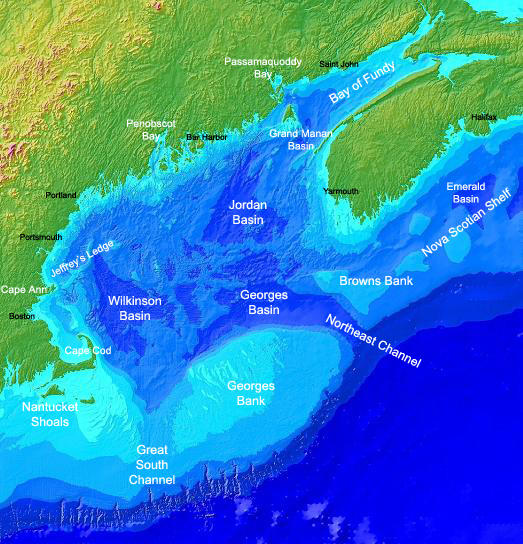Summer in the Gulf of Maine Getting Longer and Stronger – A. Thomas
NPR Interview – Fresh Air Stream Link below
http://capeandislands.org/post/summer-gulf-maine-getting-longer-and-stronger#stream/0
The waters off New England’s coast are warming faster than 99.9% of the world’s oceans. A new study finds that summer-like conditions in the Gulf of Maine now last two months longer than they did just a few decades ago. And that’s not necessarily a good thing.
Credit National Oceanographic and Atmospheric Administration and U.S. Geological Survey (USGS) Woods Hole, MA Labels by Syagria / Public Domain
Scientists have known for a handful of years that the waters off the northeast coast are warming at an unusually rapid rate. Over the course of thirty three years, the average temperature has gone up about one degree. But the warming hasn’t happened steadily.
“Over about a thirty year period, the Gulf of Maine was warming about three times faster than the average global ocean,” explained Andrew Thomas, a professor at University of Maine School of Marine Sciences. “But, in the last decade, it has warmed faster than about 99% of the global ocean.”
With that surprising result in hand, Thomas and a number of colleagues decided to try to break things down even further. The looked at water temperatures on a month-by-month basis and found the strongest warming has been happening during the summer and into the fall. In fact, in some places, winter temperatures have dropped slightly.
But, the warming during the summer and early fall has been so dramatic that it has extended “summer conditions” by sixty six days – more than two months – over the course of 33 years.
“There are going to be winners, and there are going to be losers,” Thomas said. “If you’re a tourist and you want to swim on the beaches, a longer, warmer summer sounds fine. But there are definitely marine species that are going to have trouble adapting to that kind of change, because it’s happening very rapidly.”
Thomas says the extreme warming in the Gulf of Maine is clearly linked to global increases in ocean temperatures due to human-caused climate change, but local factors like depth, ocean circulation, and the shape of the seafloor can all influence the extent of warming. He says they’ll continue to dig into what’s driving the dramatic changes off New England’s coast, while also applying the tools they’ve developed to other areas around the globe.


